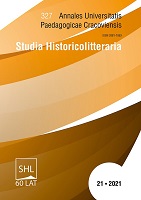António Feijó i Leopold Staff – poetyckie wizje Orientu… na tle polsko-portugalskich relacji literackich i kulturalnych (od parnasizmu do palimpsestu)
António Feijó and Leopold Staff – poetic visions of the Orient against the background of Polish-Portuguese literary and cultural relations (from Parnassianism to palimpsest)
Author(s): Anna KalewskaSubject(s): Cultural history, History of ideas, Polish Literature, Other Language Literature, 19th Century, Theory of Literature, Sociology of Literature
Published by: Wydawnictwo Uniwersytetu Komisji Edukacji Narodowej w Krakowie
Keywords: Portuguese studies; Polish-Portuguese relations; modernist poetry; culture text; palimpsest;
Summary/Abstract: The article aims to discuss the Chinese culture inspirations in Polish and Portuguese modernist poetry. In the context of Polish-Portuguese literary relationships, late Romantic, Symbolic, Parnassianism-related and Oriental tendencies are presented in the works of a Portuguese poet Antón Feijó (1859–1917), with references to a selected aspect of Leopold Staff’s works (1878–1957). A historical-literary analysis is accompanied by literary and cultural comparative studies. Within the comparative method of presenting the Parnassian palimpsests, as The Chinese Lyric Book (Cancioneiro Chinês, 1890) by António Feijó and Chinese Flute (Fletnia chińska, 1922) by Leopold Staff are categorised, the thesis about the independent status of the works in question was built. Modernist visions of the Orient, understood to date a paraphrase or an adaptation of Chinese poetry read in translations from French, gain the status of original works. In view of blurring the differences between the European adaptations – Portuguese poem and Polish poetic prose, based on Oriental motifs drawn from two different French sources (translations): Judith Gautier’s and Franz Touissant’s works – and the Chinese original, the methodological approach to the text as to a palimpsest is justified. Feijó’s “Chinese Poetry” and Oriental poetic landscapes in Staff’s prose are therefore independent literary works, analysed in parallel, as mirror reflections of the fascination with the Orient’s culture. The literary works in question fully deserve the title of cultural texts, the recipient of which will be a Polish reader, a lover of poetry inspired by French Parnassianism.
Journal: Annales Universitatis Paedagogicae Cracoviensis. Studia Historicolitteraria
- Issue Year: 2021
- Issue No: 21
- Page Range: 167-200
- Page Count: 34
- Language: Polish

